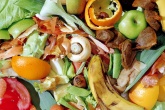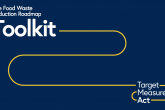WRAP targets overbuying food in new campaign
The Waste and Resources Action Programme (WRAP) has launched a new campaign encouraging people to better plan their meals, in order to prevent unintentional food waste from people buying more than they need.
The new campaign, Spoiled Rotten, which went live today (10 June) is part of WRAP’s larger Love Food Hate Waste campaign, which seeks to target the 7.1 million tonnes of food thrown out by UK households every year.
WRAP’s research has found that some 30 per cent of people don’t check their fridge before they go to the shops, while only 56 per cent of 18-34-year-olds – statistically the most wasteful age group when it comes to food – make a shopping list.
Fail to plan, plan to waste
This failure to plan ahead when buying food means that much goes unused and is then thrown out – costly for planet and pocket. The amount of CO2 emissions caused by food waste in the UK is equivalent to the CO2 generated by one in four of the cars on UK roads, while wastage costs households £230 every year in food that could have been eaten.

The campaign will include advice on how to ensure householders don’t overbuy food, such as taking a photo of the contents of their fridge – a #FridgeShelfie – before they go shopping, while on Tuesday 11 June, Masterchef quarter-finalist Imran Nathoo will be taking over the Love Food Hate Waste Instagram account (@LFHW_UK) to share his tips on how to make the most of the food you have.
“We enjoy an abundance of food everywhere we go, from farmers’ markets and supermarkets to restaurants and cafes,” said Jenny Carr, WRAP Citizen Campaigns Project Manager. “It’s never been easier to enjoy food. The problem is, that means it’s also never been easier to waste it. UK households produce 70 per cent of the country’s overall food waste – 7.1 million tonnes – which is equal to 3.5 meals per person every week!
“It’s easy to be tempted – we’re only human after all! However, if it’s going to end up in the bin, don't buy it. By buying what you need, you can save your food from the bin – helping your pocket and our planet.”
WRAP will use typical digital metrics to track engagement with the campaign, while long-term behaviour change will be gauged through its six-monthly tracker survey asking a representative sample of people in the UK about their food attitudes and behaviours, to inform WRAP about the impact its campaign will have had.
Scaling the food waste mountain
Food waste remains one of society’s clearest waste challenges, with the UN estimating around 1.6 billion tonnes of food goes to waste every year around the world – and global food waste is set to rise by almost a third by 2030. Such levels of waste are placing an unsustainable burden on the planet as food waste accounts for around eight per cent of global greenhouse emissions, while also being ethically unconscionable in a world where more than 870 million people are officially undernourished.
Government and business are beginning to take more concerted action to reduce food waste. The recent Resources and Waste Strategy proposes a number of food waste reduction initiatives, as well as mandatory separate collection of food waste by local authorities, while the voluntary Courtauld Commitment 2025 sees over 150 businesses, local authorities and trade organisations pledging to reduce food and drink waste across the supply chain by 20 per cent by 2025.
More recently, WRAP launched a Food Waste Reduction Roadmap with IGD, a research group for the food industry, which sets out actions and milestones to help UK businesses cut their food waste and get the UK on the path to halving its food waste by 2030 in line with Target 12.3 of the UN Sustainable Development Goals. The Roadmap has been backed by all major UK supermarkets and trade bodies such as the British Retail Consortium and the National Farmers’ Union.
Despite the mountains of food going to waste every year, WRAP is keen to highlight that progress is being made to bring the UK’s food waste problem under control; since 2007, UK consumers are saving an additional £3.4 billion a year by using more of the food they buy, preventing the release of around five million tonnes of CO2.
You can find out more about WRAP’s Spoiled Rotten campaign on the Love Food Hate Waste website.











